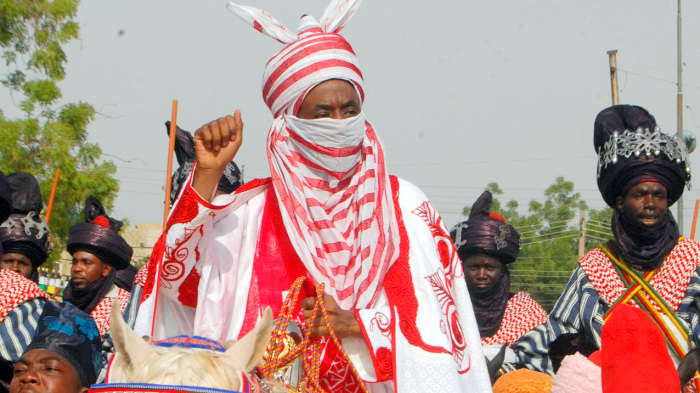‘Say: “O Allah! Lord of all Power (and rule), You give power to whoever You will and remove it from whoever You will; You elevate whoever You will and humble whoever You will. All that is good lies in Your hand: You have power over everything. – Quran 2:26
“But they plan, and Allah Plans, and Allah is the best of planners”- Quran 3:54
On the 9th of June, 2014, the late Sam Nda-Isiah wrote an article in Leadership Newspaper congratulating Sanusi Lamido Sanusi upon his ascension to the throne as Emir of Kano. In the widely circulated article, he told us about Sanusi’s ambition of becoming king and how he went from being the first Northerner to be appointed as MD of First Bank, to the drama that ensued between President Jonathan and Sanusi as CBN governor and finally to being chosen to succeed the late Ado Bayero.
I believe my mother still has that newspaper hidden somewhere.
The brilliantly written article received wide acclaim because of three things a) People always side with the downtrodden. When HRH SLS was unceremoniously sacked as CBN governor because he refused to play ball and instead exposed the $20b fraud, he gained a lot of sympathy. Nigerians sympathised with him and therefore saw his emergence as King as a sort of comeback and like my Hausa people say, throwing sand in Jonathan’s eye. b) The audacity of his ambition. The fact that a young man dared to have so many bold dreams- Bank MD, CBN governor and King of Kano and that they came true, Ah! that is the stuff Hollywood movies are made of. c) Everything about SLS instantly turns to gold. That people adore him is an understatement. Social media and even mainstream media have been awash with videos of him since the beginning of the week. I know people who have consistently advocated for his return and have not once faltered since 2020.
On the 9th of March, 2020, amidst the COVID pandemic, Governor Ganduje orchestrated the dethronement of HRH Sarki Sanusi II because of several disagreements they had. I can never forget the sombre cloud that enveloped Nigeria on that day. It was all of doom and gloom wherever you turned. It was not so much our love for the king that was shaken, it was the injustice of it all. That a whole Emir could be dethroned, just like that, over a disagreement that one could simply put down to a clash of egos, was alarming. What was it called again? Yauwa! ‘Insubordination and political interference’.
What happened to the sancity of the throne? What about respect for authority? Traditional rulers all over Nigeria started having palpitations and insomnia. If Sanusi, with all his clout could be removed, what was their fate? That singular act of immaturity, injustice and utter wickedness received much backlash and like before, endeared him even more to the heart of his everyone including his enemies. That and his banishment to a village in Nasarawa. The whole world watched as he was escorted from the Palace and transported to Nassarawa by his long-time friend and confidant, Nasir El-rufai.
Traditional institutions and figures are known for their conservatism and are expected to ensure that cultural practices and customs remain largely unchanged. However, for Sanusi Lamido Sanusi, a top banker and the 57th Emir of Kano State, Nigeria, his own mission was quite the opposite. He spent most of his reign advocating for cultural reform in Northern Nigeria.
There are many qualities that you use to describe His royal Highness: Charming, eloquent, brilliant amongst others, however quietness and docility are not amongst them. He openly defied government officials and policies which led to has ultimately led him into trouble, more times than we care to count.
Sanusi embodies the essence of a rebel, a trait evident in almost every role he’s undertaken. As the Governor of the Central Bank of Nigeria (CBN), he ousted top bank CEOs for corruption and later became a vocal critic of government policies and a whistleblower, actions that ultimately led to his dismissal.
When he became King, he gave up the ‘suit and bow tie’ life permanently for a turban and royal regalia, becoming one of the most senior Islamic figures in the country and the monarch of a highly conservative city. As Emir, he challenged conventions and sought to topple centuries old practices abruptly. To activists, he was a maverick, the poster boy for social change. However, critics called him a hypocrite, a progressive fraud who sought to reap the benefits of conservatism but evade the responsibilities that came with the position he held as the custodian of the customs of Kano.
Sanusi’s dethronement was however history repeating itself as his grandfather, Muhammadu Sanusi I, was deposed as the 11th emir of Kano 57 years ago by the then northern Nigeria regional government led by Ahamdu Bello, the late sarduana of Sokoto.
Sanusi I replaced Abdullahi Bayero, the 10th emir of Kano, who died on December 23, 1953. Prior to this appointment, he worked as a senior councilor of the emirate council where he controlled the administration of the emirate, as the sole native authority for over a decade. Upon his emergence as emir, he played key roles in the major shift in elite configuration in the state. He was also instrumental in the formation of the Northern Peoples Congress (NPC), where he brought many groups into the NPC. Much like his grandson, Sanusi I was charismatic, politically sound and influential in the northern region. He stood firmly against injustice and oppression, seizing moments to condemn any of such acts.
The apple does not fall far from the tree.
However, trouble began when most of the senior members of the NPC in Kaduna resented his influence. (Sound familiar?) This resentment led to the instituting of a commission of inquiry into the finances of the Kano native authority under Sanusi. A probe panel was set up and members of the native authority testified before D. J. M. Muffet, the sole commissioner. The panel recommended the resignation of the emir and the regional government implemented the recommendation, thereby requesting Sanusi I to resign. With little or no restraint, the late emir tendered his resignation to Kashim Ibrahim, the then governor of the northern region on March 28, 1963.
The rest, as they say is history.
While researching the emir’s lineage, I gained valuable insight into why Sanusi was so adamant to return. Here was a man who could have had any political appointment of his choosing. When asked if he was considering contesting for president of Nigeria, he replied that he would rather be the Emir of Kano. I now know why- to continue his grandfather’s legacy.ss
When the late Sam Nda-Isaih wrote his article on Sanusi becoming king, no one envisaged that he would one day be dethroned. His removal left progressives all over the country disenchanted. And yet, no one imagined that he would return. Yesterday’s reinstatement of the King will be marked in history- as there has never been a king who returned. I only wish the late media mogul-Nda Isiah- was here to witness it. He would have penned down a spectacular article!
Your royal highness, may your reign be long and successful. Our King is back!!
Ran sarki ya dade!

 Join Daily Trust WhatsApp Community For Quick Access To News and Happenings Around You.
Join Daily Trust WhatsApp Community For Quick Access To News and Happenings Around You.


